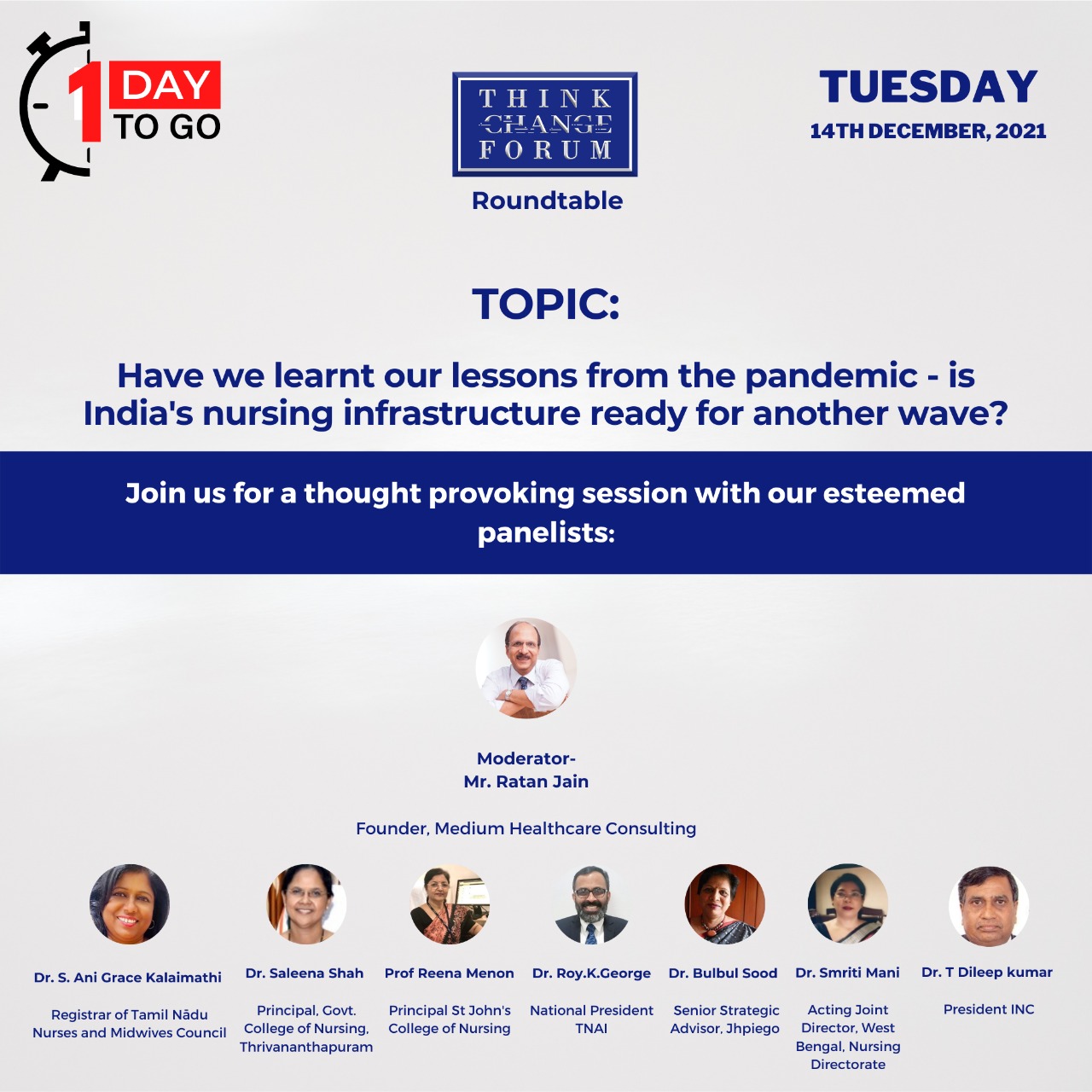14th December 2021, New Delhi
A distinguished panel at the event
- Sharad Agarwal – National President, Indian Medical Association (IMA)
He has had an illustrious career as a medical professional. He is well-known in medical circles, has worked in various capacities with prestigious medical institutions over the years.
- Varuna Pathak - Former Professor of Gynecology & Obstetrics, Gandhi Medical College, Bhopal
He is an acclaimed gynaecologist and obstetrician; he is well-respected in the medical circles. His track-record as a medical professional has been outstanding.
- Sita Naik - Professor and Head of the Department of Clinical Immunology, Sanjay Gandhi Postgraduate Institute of Medical Sciences.
She is a well-known immunologist with an impeccable track record as a medical professional. She has done remarkable work in the field of immunology through his illustrious career.
- Vidur Jyoti – Senior Director & Head, Minimal Access & General Surgery, Max Hospital, Gurgaon.
He is an acclaimed surgeon with years of experience as a medical professional. Throughout his illustrious career as a surgeon, he has been associated with many prestigious medical institutions.
- Rajesh Gupta - Additional Director, Pulmonology & Critical Care, Fortis Healthcare, Noida.
He is a very well-known pulmonologist with a proven track record of excellence in his field. He is well respected in the medical circles and has worked in various capacities with some of the most prestigious medical institutions.
- SL Vig - Assistant Professor Community Medicine - ESIC Medical College Faridabad.
He is a very well-respected practitioner of community medicine and has made a significant contribution in the field of community medicine over the years. The event organized by Think Change Forum focussed on the topic of re-introducing Indian Medical Services (IMS) to address India’s healthcare needs. The panelist at the event believed Indian Medical Services should be on par with Indian Administrative Services. The panelist was of the view that the reintroduction of Indian Medical Services (IMS) will boast the public healthcare sector and address the wide gap between healthcare demand and delivery. The panelist at the event was of the opinion IMS will help in bringing back the trust of the people in the public health sector which has been lost to private sector. The panel believes that reintroduction of IMS will help in stopping the brain drain from public medical services by attracting and retaining the best medical talent, allowing for superior healthcare outcomes with better managed facilities and processes. The panel after careful study submitted a 5-point agenda to the Government for the roll-out of IMS Point No. 1 emphasizes an excessive reliance on private sector for meeting healthcare demands of Indian citizens. Overall, the healthcare infrastructure is fractured and falls short of expectations. An eminent doctor and panelist Dr Rajesh Gupta said most of the Indian public relies on the private sector for healthcare services, with 60% of inpatient admissions (IPDs) and 80% of outpatient visits (OPDs) occurring in private facilities. The panelist at the event raised Point No.2 they highlighted challenges in staffing the public healthcare system with skilled doctors and nurses. Lack of incentives for these highly educated professionals to work under generalist administrators has resulted in brain drain. Dr Sharad Kr Agarwal said the implementation of IMS holds the promise of enhancing service quality through induction of skilled doctors and addressing the persistent doctor shortage, especially in rural areas. The 3rd Point that the panelist at the event raised was the necessity of superior health outcomes for the citizens with better managed facilities and processes, which will happen when no longer generalists will be managing the specialists. Dr. Sharad Agarwal said that IMS will balance both clinical expertise and administrative skills. The panelist observed that to avert growing incidences of health crises and reduction in tertiary cases improving preventive healthcare and delivery at primary healthcare levels is the answer. An effective IMS will enable this, which in turn will reduce the cost of health for all stakeholders. One of the well -known panellist Dr. Vidur Jyoti observed that we were moving into disease management and neglecting health management which has put immense pressure on the tertiary system. A noted panelist Dr SL Vig believed we have to offer primordial prevention and primary prevention as the lower classes do not have access to preventive health care, they only get health care when a disease reaches a critical stage. Dr SL Vig further observed that health should be a state subject, and the IMS cadre can serve as a force multiplier to implement central healthcare policies and schemes according to healthcare requirements at the state and community levels. The panelist at the event through the 4th Point highlighted the importance and role of IMS in enabling seamless coordination and cooperation between the central and state health departments, for improved national healthcare policies for the country. The panelist at the event were unanimous in their opinion that strengthening the IMS was the way forward in terms of better health care services and health related coordination between the centre and the states.

